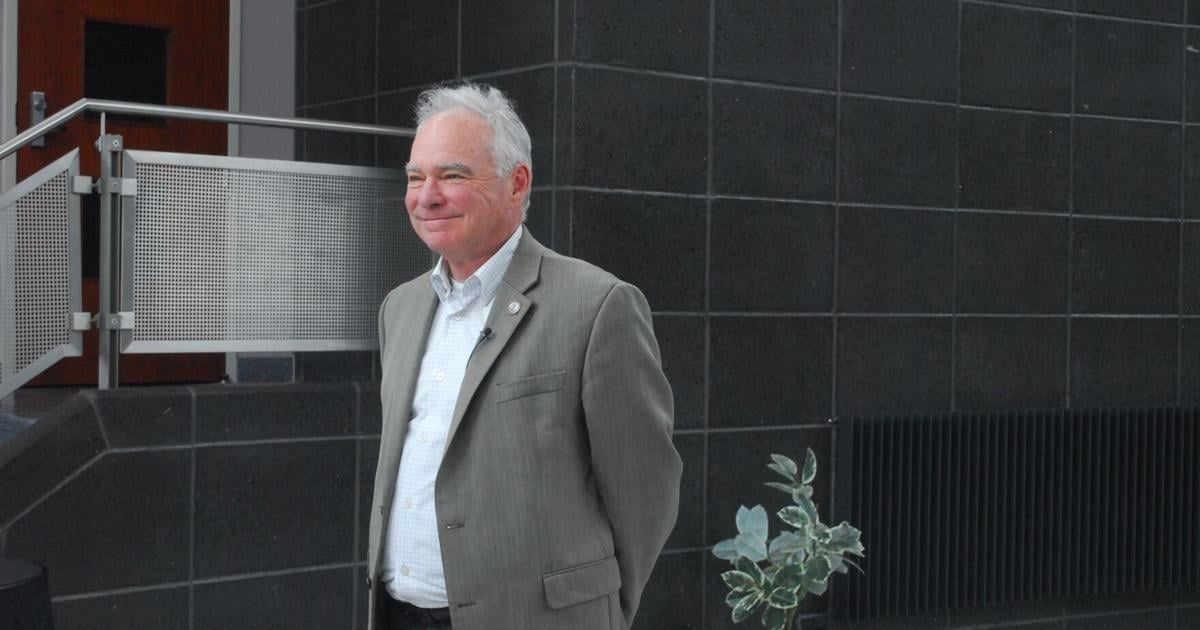Senator Tim Kaine [D-VA] visited with business leaders at the Institute of Advanced Learning and Research in Danville on Tuesday, April 22, to discuss the economy, and hear concerns or questions businesses had specifically related to tariffs being threatened or imposed by the Trump administration – and, in some cases, the potential loss of anticipated federal funding.
Some Danville manufacturers export goods outside of the country, and/or import materials from various nations around the world to use in their production processes. The threat of tariffs has caused no small amount of concern locally, and nationally; it will be consumers and U.S. businesses who pay the price. The tariffs are effectively a sales tax, Kaine said.
“Some businesses that manufacture import raw materials from other nations to use in their manufacturing processes. Those raw materials go up 10%, 25%, that means the product that they charge to their customer goes up. It makes them less competitive,” Kaine said. “Or, if you’re manufacturing products here – and a couple of the businesses I talked to, they are exporting to other nations – but if other nations put huge tariffs on our products because they’re mad that we’re putting tariffs on theirs, it suddenly becomes harder to export.”
Tariffs have a place, Kaine said – for use against adversaries, or to target specific trade imbalances – but the way they are being used by the current administration is causing instability.
“I’m troubled by that, and I have a couple pieces of legislation that I’m pushing to bring order to some chaos,” Kaine said.
Several weeks ago, Kaine challenged the president’s tariffs on Canada, and received the support of both Republicans and Democrats in the Senate to reject those tariffs. That bill must pass the House now, but cleared the Senate.
Kaine said he is using the same procedure to challenge tariffs imposed on “every nation in the world” by the White House.
“I think, again, I’m going to get Republican support. Not just Democrats, but Republicans saying, ‘This is the wrong way to look at tariffs. It’s damaging the economy. Let’s turn off the tariff barrage and put some more stability into our economy right now,’” Kaine said.
Nationally, agriculture – which is an economic driver in Pittsylvania County – stands to be especially impacted by proposed tariffs.
“American agriculture is so productive. We produce much more food than we can eat, so American farmers have to have an export… or their products just rot on the ground, but if those products become more expensive, other nations don’t buy from us. They’ll buy from others,” Kaine said.
Kaine has spent years working to expand economic development in the region, as well as advocate for expanding access to job training programs. A member of the Senate Health, Education, Labor and Pensions (HELP) Committee, Kaine helped secure $100 million in funding for Microporous’ manufacturing facility at Pittsylvania County’s Southern Virginia Megasite through the Bipartisan Infrastructure Law. The company is projected to create 2,015 jobs.
The lithium-ion battery separators manufacturer represented a $1.35 billion investment, a press release on Nov. 13, 2024, announced. Virginia Governor Glenn Youngkin praised the development, as did Kaine and Senator Mark Warner (D-VA), who helped negotiate the Bipartisan Infrastructure Law.
Despite the strides forward and the initially hopeful outlook, Microporous is facing a potential setback by the possible loss of the $100 million federal grant, made available through the Inflation Reduction Act passed by Congress during the Biden presidency.
“The Inflation Reduction Act had tax credits and grants for clean energy projects, and obviously that was an important feature in Microporous’ decision,” Kaine said. “There were other incentives – state incentives, federal incentives – but this Inflation Reduction Act grant was a really important piece of it.”
However, Kaine said he feels hopeful the Trump administration will reconsider this decision if thought is put into it.
“I hope, and I believe, that the Trump administration may pause and say, ‘Wait a minute. This is a great investment. This is American manufacturing. This is American innovation. We wouldn’t want to get in the way of it.’ I’m very hopeful that that grant is going through, and that Microporous will be a big leader,” Kaine said.
The threat of tariffs can put off investors, hobbling economic growth when there is uncertainty about the economic outlook.
“What I heard from the businesses here is, Danville has had tremendous success in recent decades attracting investment, but there’s a lot of uncertainty, and when there’s uncertainty about tariffs or other economic issues, regulatory issues, then businesses tend to pull back, and they say, ‘Well, we might want to invest, but we’re going to wait until we see certainty before we make those decisions,’” Kaine said.
Kaine said he heard a lot of good reports about Danville’s economic strides last Tuesday, but also a lot of uncertainty.
Many businesses were not comfortable publicly sharing concerns, as they did not want to face retaliation for criticism of the situation, especially if they are in the process of appealing grant freezes and the like.
Economic growth remains a focus. The bipartisan JOBS Act would allow students to use Pell Grants “to pay for shorter-tern, high-quality job training programs.”
